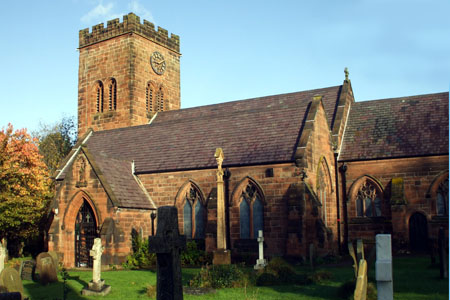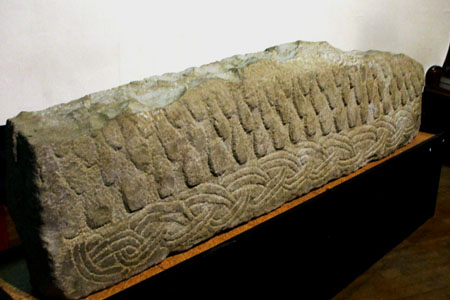| |
 |
 |
 |
| Comment on this report, or find other reports. |
 |
| Our Mystery Worshippers are volunteers who warm church pews for us around the world. If you'd like to become a Mystery Worshipper, start here. |
 |
| Find out how to reproduce this report in your church magazine or website. |
|
|
| 2269: St Bridget's,
West Kirby, Wirral, England |
 |
 |
 |
Mystery
Worshipper: Torold.
The church:
St
Bridget's, West Kirby, Wirral, England.
Denomination:
Church
of England, Diocese
of Chester.
The building:
St Bridget’s stands in a picturesque leafy setting, with a lych
gate that leads into the well kept churchyard. This mellow sandstone
parish church, a site of worship for over 1000 years, is now
mainly 14th, 15th and 16th century masonry and window tracery,
though much was restored in 1869/1870. The 16th century tower
houses a peal of eight bells, four of them being over 200 years
old. The porch has black and white painted timbers, typical
of many other buildings in Cheshire. The chancel is almost as
big as the nave, and is separated from the main body of the
church by decorated, wrought-iron screens. There is much work
by Charles Kempe, the noted Victorian stained glass artisan.
The windows alone span most of Kempe’s career, from 1870 to
1907. St Bridget is depicted in one of the many windows. Also
the painted and stenciled work above the chancel arch is to
Kempe’s designs, though the wooden figures may have been carved
in Oberammergau. The Dawson-Brown Museum is housed in the old
school room and contains interesting artifacts of local interest.
The church:
They maintain strong ties with local community. The primary
school adjacent to the church serves the area. The parish hall
is kept busy with many events and is currently being rebuilt.
The pretty setting makes it a popular venue for the many weddings
that take place here. Activities are listed in the parish magazine
(a good buy at 30p) and include youth group, sewing group and
book discussion group.
The neighbourhood:
The Vikings settled in the area, coming in from Ireland in the
10th century. Other village names nearby end in the Norse "-by"
(Frankby, Irby, Pensby). Viking stones have been found, especially
a famous hogback stone that was possibly used as a gravestone
or door lintel. (The term "hogback" refers to the
curving top of the stone.) The Ring o’ Bells hostelry close
by is reputed to have been used by smugglers, and a bricked-up
tunnel is said to link with the nearby manor farm. Staff at
the Ring o’ Bells have felt the ghostly presence of a long-dead
innkeeper, killed when the cellar door crashed down on him,
who haunts on winter’s nights when the wind rattles round the
windows and causes the inn sign to swing and creak. The whole
area has recently come under the spotlight of historians thanks
to its Viking past.
The cast:
The Revd John Bleazard, their newly called rector, was the celebrant
and preacher.
The date & time:
Feast of All Saints (Anticipated), Sunday, 30 October 2011,
10.00am.
What was the name of the service?
Parish Communion with Baptism (of baby Isaac).
How full was the building?
Largely full.
Did anyone welcome you personally?
A smiling sidesman said hello and handed me a hymn book and
a parish notice sheet for the week ahead. There were two service
leaflets as well: All-Age Communion and Baptism
During Morning Worship.
Was your pew comfortable?
Fairly comfy pew of the long variety, with a carpet pew runner.
Decorated tapestry hassocks with a little hook for hanging.
Ledge for hymn book.
How would you describe the pre-service
atmosphere?
On approaching the church, I heard the bells peal a welcoming
sound. However, on entering, I noticed a good deal of chatter
and a general hubbub. The bells ceased at five before the hour
and the organ took over, though the volume was too loud for
me to meditate properly. The chatter continued.
What were the exact opening words of the
service?
"Welcome to St Bridget’s on this All Saints Day!"
What books did the congregation use during the
service?
Service sheets; Complete Anglican Hymns, Old and New;
The Holy Bible, New International Version.
What musical instruments were played?
Pipe organ. A robed choir of six led the singing.
Did anything distract you?
A small child with the baptism party let everyone know he was
there! He was taken outside for a while. When he returned, he
seemed much quieter.

Was the worship stiff-upper-lip,
happy clappy, or what?
Middle-of-the-road C of E with vestments, white for All Saints.
Reserved sacrament in the Lady chapel, where mid-week communion
and daily offices are said. I’d say they are half way up the
candle. The rector gave us all a good splashing with holy water
as we sang the Taize chant Ubi caritas et amor quietly
after the baptism: "Where charity and love are, there is
God." Smiles all around! But trying to compress two sacramental
services into one did not work for me. The worship seemed rather
hollow.
Exactly how long was the
sermon?
3 minutes.
On a scale of 1-10, how good was the preacher?
6 – The rector preached without notes; his delivery was
rather tedious and repetitive.
In a nutshell, what was the sermon
about?
Two thousand years ago, and two thousand miles away, Jesus'
disciples and the crowds of people who had heard Jesus preaching
had their doubts, yet they still had faith. And it’s that mixture
of doubt and faith that, down the ages, has characterised the
saints. We are here today, like the saints of old, with our
faith and our doubts, about to pass on that story of Jesus to
young Isaac, the baptism candidate. We want him to be part of
the story of Jesus today, a story that is now worldwide and
not two thousand miles away.
Which part of the service was like being in
heaven?
The splendid Kempe stained glass all around the church and the
painted scenes over the chancel arch were a real joy to behold;
a kaleidoscope of colours.
And which part was like being in... er... the other place?
Perhaps it was the yells of the small child that distracted
me more than usual, but I could not find nor feel much real
spirituality that morning. Even during the peace, while many
smiles were exchanged, I found the people wandering around too
much. And I am usually a tolerant individual.
What happened when you hung around after the service looking lost?
The couple next to me were visitors too, so we smiled and started
a conversation as the organist played the postlude.
How would you describe
the after-service coffee?
No mention had been made of refreshments, though a table had
been set up. We drifted over and had fairly traded tea or coffee
or orange squash. There were biscuits from a big tin of assorteds
and a saucer for donations. Drinks were hot and tasted OK. Another
baptism service was to follow shortly, so I drank up quickly
and departed, making my way towards the Ring o’ Bells to sample
spirits of a different nature.
How would you feel about
making this church your regular (where 10 = ecstatic, 0 = terminal)?
5 – Perhaps if I visited on an ordinary occasion, without
baptism and without another service to follow immediately afterward,
I might feel there was a more agreeable atmosphere.
Did the service make you feel glad to be a
Christian?
Not especially.
What one thing will you remember about all this in seven days' time?
The wealth of stained glass. |
|
|
 |
 |
 |
| We rely on voluntary donations to stay online. If you're a regular visitor to Ship of Fools, please consider supporting us. |
 |
 |
 |
| The Mystery Pilgrim |
 |
| One of our most seasoned reporters makes the Camino pilgrimage to Santiago de Compostela in Spain. Read here. |
 |
 |
 |
| London churches |
 |
| Read reports from 70 London churches, visited by a small army of Mystery Worshippers on one single Sunday. Read here. |
| |
|
|
|
|


